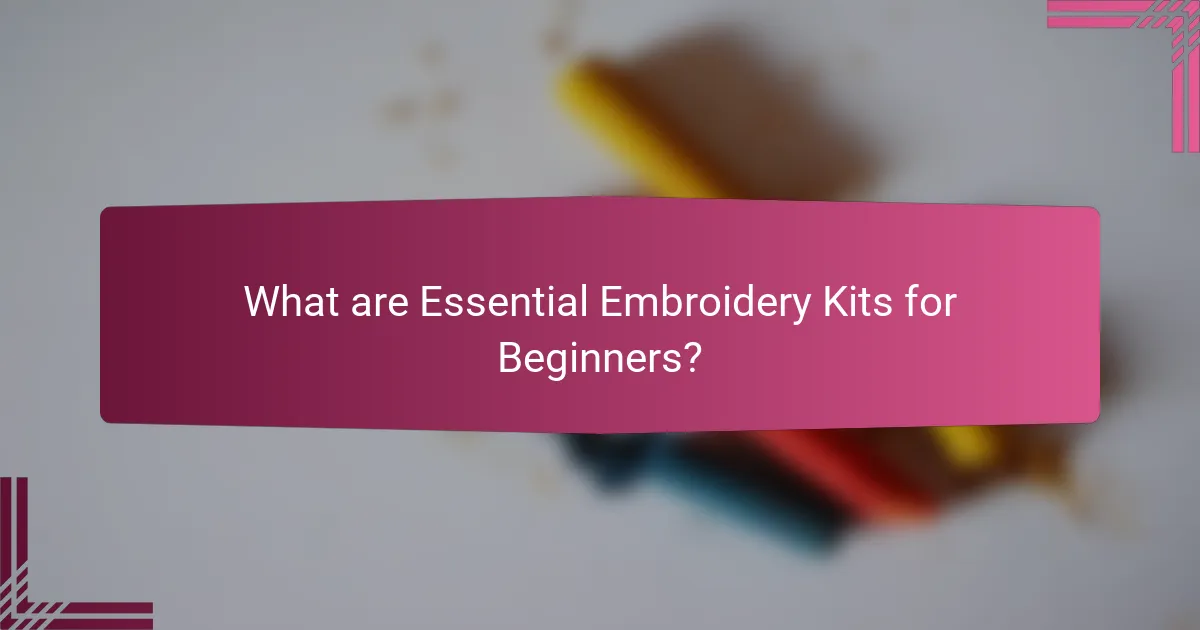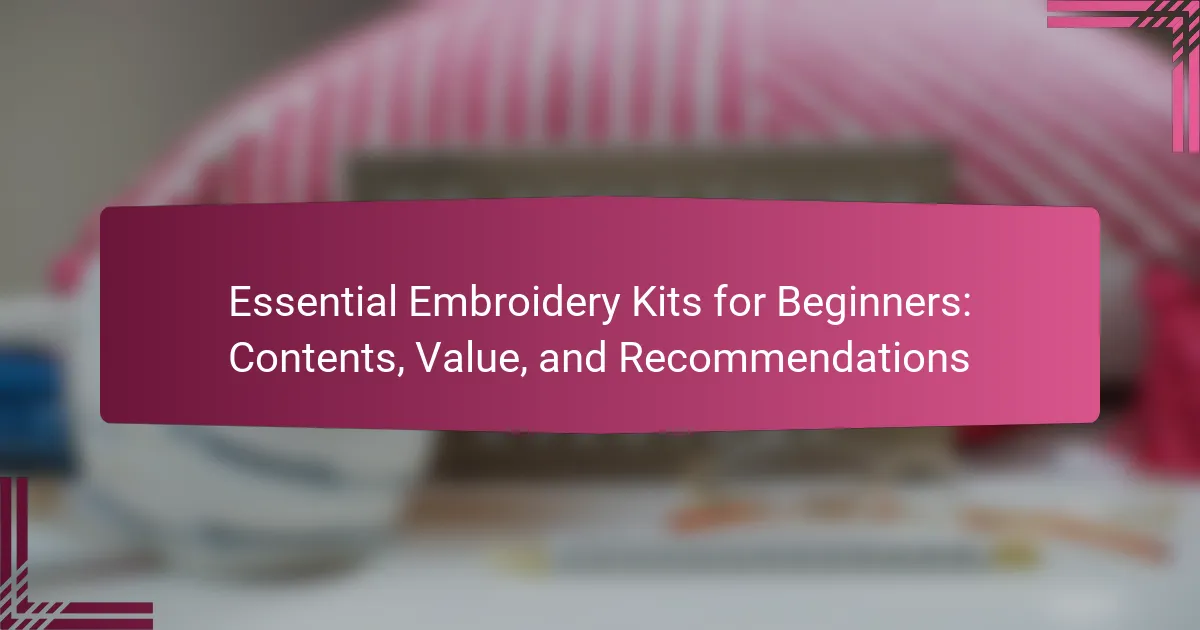
What are Essential Embroidery Kits for Beginners?
Essential embroidery kits for beginners include basic supplies necessary for starting embroidery projects. These kits typically contain embroidery floss, needles, fabric, and hoops. They may also include instructional materials or patterns. The presence of these items simplifies the learning process for newcomers. According to the Embroidery Association, beginner kits help in developing foundational skills. These kits provide all essential tools in one package, making them convenient for new crafters.
Why should beginners use embroidery kits?
Beginners should use embroidery kits because they provide all necessary materials in one package. These kits typically include fabric, threads, needles, and patterns. This convenience eliminates the need for beginners to source individual supplies. Additionally, embroidery kits often feature beginner-friendly instructions. These instructions guide users through the stitching process step-by-step. Research indicates that using kits can enhance learning efficiency for new crafters. A study by the Craft Yarn Council found that 70% of beginners felt more confident using kits. Overall, embroidery kits simplify the learning curve and foster creativity for novices.
What skills do beginners develop using embroidery kits?
Beginners develop several skills using embroidery kits. These skills include hand-eye coordination, which improves as they manipulate the needle and thread. They also learn pattern reading, essential for following designs accurately. Threading needles and managing threads enhances fine motor skills. Additionally, beginners gain patience and focus through the meticulous nature of embroidery. Color theory is often explored as they choose thread colors for their projects. Problem-solving skills are developed when troubleshooting mistakes or adjusting designs. Overall, embroidery kits provide a comprehensive skill-building experience for beginners.
How do embroidery kits simplify the learning process?
Embroidery kits simplify the learning process by providing all necessary materials in one package. These kits typically include pre-printed fabric, threads, needles, and instructions. Beginners can easily follow step-by-step guides included in the kits. This structured approach reduces the overwhelm of sourcing individual supplies. Additionally, the kits often feature beginner-friendly designs that build confidence. Clear instructions help learners grasp essential techniques effectively. By having everything organized, embroidery kits foster a focused learning environment. This convenience accelerates skill acquisition and encourages practice.
What are the typical contents of an essential embroidery kit?
An essential embroidery kit typically contains embroidery floss, needles, and fabric. Embroidery floss is used for stitching and comes in various colors. Needles are necessary for threading and piercing the fabric. Fabric serves as the base for the embroidery work. Additionally, most kits include scissors for cutting threads. A hoop may also be included to keep the fabric taut while working. Some kits provide patterns or instructions for beginners. Lastly, a storage case is often part of the kit to organize the supplies. These contents ensure that beginners have the necessary tools to start embroidering effectively.
What tools are included in beginner embroidery kits?
Beginner embroidery kits typically include essential tools for starting the craft. Common tools found in these kits are embroidery hoops, needles, and embroidery floss. Many kits also contain fabric, which serves as the base for the embroidery work. Scissors are usually included for cutting threads and fabric. Additionally, beginner kits may feature a needle threader to assist with threading needles. Some kits provide instructional guides or patterns to help beginners learn techniques. These components are designed to offer a comprehensive introduction to embroidery for novices.
What types of threads and fabrics are commonly provided?
Common types of threads provided in embroidery kits include cotton, polyester, and silk threads. Cotton threads are widely used for their versatility and ease of use. Polyester threads offer strength and durability, making them suitable for various projects. Silk threads are known for their luxurious sheen and smooth texture.
Fabrics commonly included in embroidery kits are cotton fabric, linen, and canvas. Cotton fabric is favored for its softness and availability in various colors. Linen is appreciated for its natural texture and strength. Canvas is often chosen for projects requiring sturdiness.
These threads and fabrics are essential for beginners to create a range of embroidery designs effectively.
How do embroidery kits vary in value for beginners?
Embroidery kits vary in value for beginners based on their contents and quality. Basic kits often include essential materials like threads, needles, and fabric. These kits typically range from $10 to $30. More advanced kits provide additional tools and patterns, increasing their value to $30 to $100. The quality of materials, such as premium threads or specialty fabrics, also affects the price. Beginners may benefit from kits that offer instructional guides, enhancing their learning experience. Overall, the value is determined by the balance of quality, quantity, and educational resources provided in the kit.
What factors influence the price of embroidery kits?
The price of embroidery kits is influenced by several key factors. The quality of materials used in the kit significantly affects the price. High-quality threads and fabrics typically cost more. The complexity of the design also plays a role. Intricate patterns require more resources and time to produce. Brand reputation can influence pricing as well. Established brands often charge a premium for their products. The inclusion of additional tools, like hoops or needles, can increase the kit’s overall cost. Lastly, market demand and seasonal trends can impact prices, with higher demand often leading to increased costs.
How can beginners assess the quality of an embroidery kit?
Beginners can assess the quality of an embroidery kit by evaluating its contents, materials, and instructions. Quality kits typically include high-quality threads, durable fabrics, and a variety of needle sizes. Beginners should check for clear, detailed instructions that are easy to follow. The inclusion of additional tools, such as scissors or a hoop, can also indicate a well-rounded kit. Reviews and ratings from other users provide insight into the kit’s performance and usability. A reputable brand often ensures better quality and customer support.
What recommendations are there for choosing the right embroidery kit?
Choose an embroidery kit based on your skill level and project goals. Beginners should select kits that include clear instructions and beginner-friendly designs. Look for kits that provide all necessary materials, such as threads, needles, and fabric. Check for the quality of materials; higher quality threads and fabrics enhance the final product. Consider the theme or design of the kit; it should match your interests to keep you motivated. Reviews and ratings from other users can offer insights into the kit’s usability and satisfaction. Finally, ensure the kit fits your budget while meeting your requirements. These factors contribute to a fulfilling embroidery experience.
How should beginners select a kit based on their interests?
Beginners should select an embroidery kit based on their specific interests and skill levels. First, identify the type of embroidery that appeals to you, such as cross-stitch, hand embroidery, or machine embroidery. Each type has distinct techniques and outcomes. Next, consider your skill level. Some kits are designed for absolute beginners, while others may require prior experience.
Additionally, evaluate the kit’s contents. A good kit should include essential tools and materials, such as threads, needles, and fabric. Look for kits that offer clear instructions and patterns tailored to your interest. Reading reviews can provide insight into the quality and suitability of the kit.
Finally, check the value of the kit. Compare prices and included items to ensure you are getting a fair deal. Selecting a kit that aligns with your interests enhances the learning experience and enjoyment of embroidery.
What brands are known for quality beginner embroidery kits?
Brands known for quality beginner embroidery kits include DMC, Dimensions, and Bucilla. DMC offers a range of kits featuring vibrant colors and easy-to-follow instructions. Dimensions is recognized for its diverse designs and user-friendly patterns. Bucilla specializes in beginner-friendly kits with clear guidance and quality materials. These brands have established a reputation for producing reliable and accessible embroidery kits suitable for novices.
What tips can help beginners get the most out of their embroidery kits?
To get the most out of embroidery kits, beginners should start with simple projects. Choosing easy patterns helps build confidence and skills. Familiarizing oneself with the tools in the kit is essential for effective use. Understanding thread types and fabric choices enhances the quality of work. Practicing basic stitches is crucial for mastering techniques. Following instructional videos can provide visual guidance. Organizing materials keeps the workspace tidy and efficient. Lastly, patience is key; embroidery requires time to develop proficiency.
How can beginners effectively practice their embroidery skills?
Beginners can effectively practice their embroidery skills by starting with simple projects. They should choose basic patterns to build confidence. Using quality materials enhances the learning experience. Regular practice helps improve technique and accuracy. Beginners should also watch instructional videos for visual guidance. Joining embroidery groups fosters community support and feedback. Tracking progress through a journal can motivate continued practice. Finally, experimenting with different stitches expands skill sets.
What common mistakes should beginners avoid when starting with embroidery kits?
Beginners should avoid several common mistakes when starting with embroidery kits. One mistake is not reading the instructions carefully. Many kits come with detailed guides that are essential for success. Another mistake is using the wrong needle or thread. Each project requires specific tools for optimal results. Beginners often skip practicing basic stitches. Mastering foundational techniques is crucial for more complex designs. Additionally, not preparing the fabric properly can lead to uneven stitching. Pre-washing and ironing fabric helps achieve a better outcome. Lastly, beginners may rush through projects. Taking time ensures quality and enjoyment in the process.
Essential embroidery kits for beginners are comprehensive packages that include the necessary supplies such as embroidery floss, needles, fabric, and hoops, often accompanied by instructional materials. These kits simplify the learning process by providing all essential tools in one place, enhancing efficiency and confidence among new crafters. The article explores the typical contents of these kits, the skills beginners can develop, factors influencing their value and price, and recommendations for choosing the right kit based on individual interests and skill levels. Additionally, it highlights common mistakes to avoid and offers tips for maximizing the embroidery experience.
